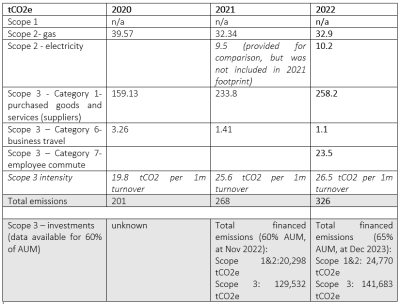Climate change is one of the biggest challenges of our times and there is an urgent need for collective action.
In 2019, EQ Investors (EQ) committed to net-zero greenhouse gas emissions by 2030. To make that happen, we’ve committed to the SME Climate Hub and UN Race to Zero. You can view our strategy here. As part of our commitment, we report on activities and progress against our targets.
EQ’s net-zero working group: activities & improvements
The members of the working group achieved the following improvements, targeting real reduction in our associated footprint:
- Through continued engagement with building management, this year (summer 2023) our heating/cooling system was upgraded to be fully electric. The gas supply to our building has been stopped. We expect this to significantly reduce EQ’s associated emissions with energy use and contribute to the meeting of EQ’s Scope 1 & 2 reduction targets.
- We engaged with nine relevant suppliers this year, aiming to improve carbon data transparency and net-zero ambitions. For our eight leading suppliers (by spend), we have either obtained their carbon data, or are in engagements to provide this. This data transparency will lay the ground for escalation. For example, setting minimum supplier expectations.
- Working with EQ’s investment team, we have designed and signed-off the net-zero strategy for EQ’s managed investments. This draws on best practices from across the industry and three years of engagement with asset management partners. We are now working on the implementation of the strategy and will share more details in due course.
We continue to improve EQ’s carbon accounting and measurement methodologies, and the last year included three changes to align with evolving best practices:
- We have chosen to embrace the location-based methodology for Scope 2 measurement, given the fact green energy tariffs are rarely additional and often criticised. We will continue to apply this more conservative approach until we find full assurance over the renewable energy sourcing of suppliers.
- We collected data on our employees’ commuting habits and were able to include Scope 3 Category 7 in our footprint measurement for the first time.
- We sought our more standardised carbon emissions factors (which feed into our supplier footprint), exclusively using government agency or academia-backed factors.
EQ’s carbon footprint
Every year, we aim to measure the material emissions associated with our business. This includes the emissions associated with our purchased energy for our offices (Scope 2) and emissions associated with business travel, employee commuting and our suppliers (material Scope 3).
We also measure and disclose the associated emissions with the investments we manage on behalf of our clients, using industry standard methodologies (PCAF financed emissions).
Furthermore, we have created our interactive carbon calculator tool to disclose the associated carbon emissions with our portfolios, including a comparison to a world equity benchmark as a proxy for the wider market.
Annual breakdown:

It is worth commenting on the drivers behind the increased emissions associated with EQ’s footprint from 2021 to 2022.
- Scope 2: We previously excused the electricity footprint given our green tariff, using the spend-based methodology for Scope 2. This year we have chosen to embrace the location-based methodology instead, given the fact green energy tariffs are rarely additional and often criticised.
- Scope 3 (operations): Having invested more into our processes and resources over the past year, our absolute spending increased, reflecting in higher associated emissions with our supplier spending. This increased the Scope 3 (Category 1) footprint given we apply a spend-based estimation methodology. In addition, we included employee commuter footprint for the first time.
- Scope 3 (investments): The difference was driven by changes in our fund allocation between the years, as well as stock allocation within these funds. For example, we increased EQ’s flows to funds supporting waste management & water themes, which have higher emissions intensities (yet significant other environmental benefits are not captured by the emissions measurement). Furthermore, some high-conviction funds increased their associated emissions due new investment in environmental industrial businesses which show higher Scope 1,2 and 3 emissions, but also avoid emissions through their sold products.
2022 offsetting activities
EQ fully offset its 2022 carbon footprint covering Scope 2, and operational Scope 3 carbon equivalent emissions (Total: 326 tonnes) using a removal offset focused on reforestation in Ghana, sourced via Respira. This project is helping to rebuild and expand the forest back to the previously healthy cover that has been degraded through overexploitation and agricultural land-use and encourage its sustainable use thereafter with strong community involvement. We supported the same project in our previous offsetting activities.
As in previous years, the remaining carbon budget was allocated to two climate-relevant charities:
- Global Canopy: a charity that specialises on building nature-related databases that help understand complex supply chains, deforestation patterns and hold companies and countries to account. Its insight helps financiers and governments make more informed decisions and support the transition away from destructive uses of natural resources.
- ClientEarth: a charity using legal expertise to defend the planet from those polluting it. Among other wins, the charity’s lawyers took legal action against Shell for mismanaging its energy transition in respect to the Paris Climate Agreement, pressing for more stringent decarbonisation plans as part-remediation.
Your own footprint
If you are curious about your own footprint and want to understand priority areas to address it, we recommend you explore the World Wildlife Fund’s (WWF) carbon footprint calculator: https://footprint.wwf.org.uk/#/